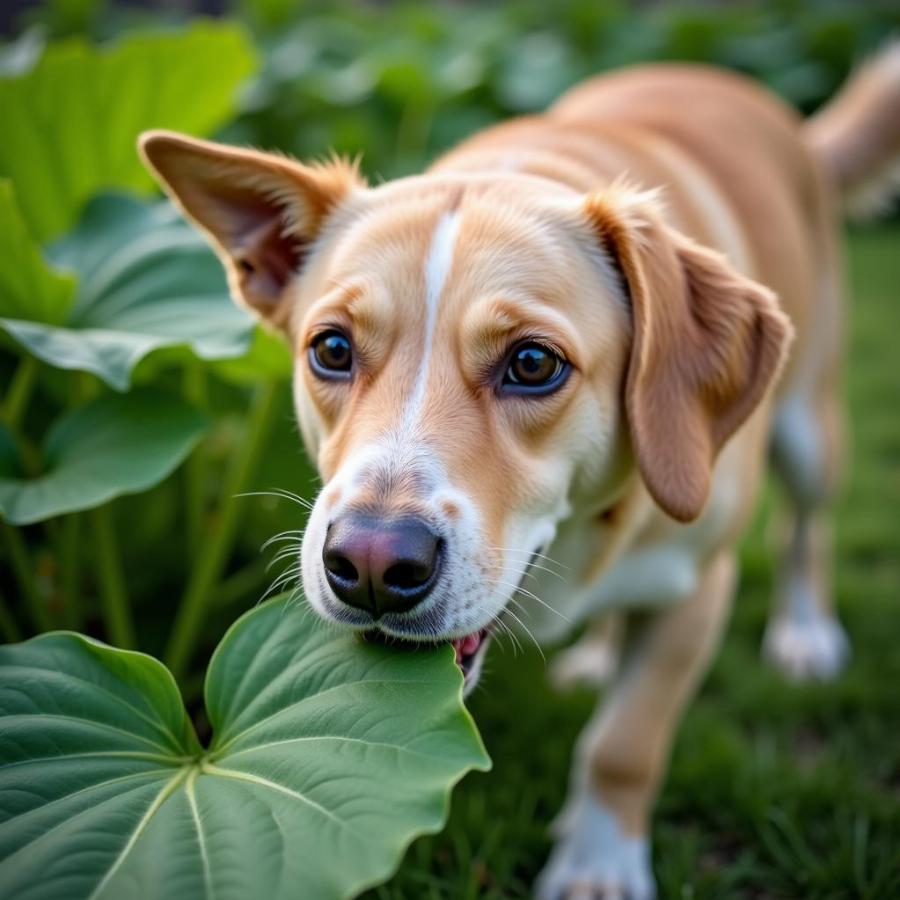Hostas, those lush, leafy perennials that brighten up shady gardens, are unfortunately toxic to dogs. If your furry friend decides to sample these attractive plants, it could lead to a range of unpleasant symptoms and even require a trip to the vet. Understanding the risks and taking preventive measures are crucial to keeping your canine companion safe. This article will explore the toxicity of hostas to dogs, the symptoms of hosta poisoning, and how to protect your pet from this common garden hazard.
Why Are Hostas Poisonous to Dogs?
Hostas contain saponins, which are glycosidic surfactants, naturally occurring compounds that act as a defense mechanism against insects and other pests. These saponins are what make hostas toxic to dogs. When ingested, they can irritate the mouth, throat, and digestive system. While not typically deadly, hosta ingestion can cause significant discomfort and potential health problems for your dog.  Chó ăn cây hosta
Chó ăn cây hosta
Symptoms of Hosta Poisoning in Dogs
If your dog ingests a hosta, you might observe a variety of symptoms, ranging from mild to more severe. Some common signs of hosta poisoning include:
- Vomiting
- Diarrhea
- Drooling excessively
- Abdominal pain
- Loss of appetite
- Lethargy
- Depression
In more severe cases, symptoms can include:
- Blood in vomit or stool
- Difficulty breathing
- Seizures
If you notice any of these symptoms and suspect your dog has eaten a hosta, contact your veterinarian immediately. Early diagnosis and treatment are essential for a quick recovery.
How to Protect Your Dog from Hostas
Prevention is always better than cure. Here are some practical steps you can take to prevent your dog from accessing hostas in your garden:
- Relocate Hostas: Consider moving your hostas to a raised bed, a fenced-off area, or hanging baskets where your dog cannot reach them.
- Train Your Dog: Teach your dog a strong “leave it” command. This can be invaluable in preventing them from munching on forbidden plants.
- Supervise Your Dog: When your dog is in the garden, always supervise them closely. This is particularly important for puppies or dogs known to chew on plants.
- Dog-Friendly Landscaping: Create a dog-friendly garden by choosing non-toxic plants. There are many beautiful and safe alternatives to hostas. dog friendly perennials
- Use Barriers: Consider using physical barriers, such as fencing or netting, around your hostas to prevent access. dog barrier fence
What Should I Do if My Dog Eats a Hosta?
If you suspect your dog has eaten a hosta, act quickly:
- Remove any remaining hosta material from your dog’s mouth.
- Call your veterinarian or an animal poison control center immediately. They will advise you on the best course of action.
- Be prepared to provide information about your dog’s size, breed, age, and the amount of hosta ingested. This will help the vet determine the appropriate treatment.
- Follow your veterinarian’s instructions carefully. Treatment may include inducing vomiting, administering activated charcoal to absorb the toxins, or providing supportive care such as fluids.
Are There Any Dog-Friendly Alternatives to Hostas?
Absolutely! Many beautiful and safe alternatives to hostas exist that will add color and texture to your garden without posing a risk to your dog. Consider ferns, spider plants, or African violets, all non-toxic options that thrive in shady conditions.
FAQ: Hosta Toxicity and Dogs
Q: How toxic are hostas to dogs?
A: While rarely fatal, hostas can cause significant discomfort and gastrointestinal upset in dogs.
Q: What part of the hosta is toxic to dogs?
A: All parts of the hosta plant are toxic to dogs due to the presence of saponins.
Q: How long after eating a hosta will a dog show symptoms?
A: Symptoms typically appear within a few hours of ingestion, but can sometimes be delayed.
Q: Can a dog recover from hosta poisoning?
A: Yes, with prompt veterinary care, most dogs recover fully from hosta poisoning.
Q: Are there any home remedies for hosta poisoning in dogs?
A: No, do not attempt to treat hosta poisoning at home. Always consult with a veterinarian for appropriate treatment.
Q: How can I make my garden safer for my dog?
A: Remove toxic plants, use barriers, and supervise your dog when they are outdoors.
Q: Are there other common garden plants that are toxic to dogs?
A: Yes, many plants are toxic to dogs, including tulips, daffodils, azaleas, and sago palms. Research thoroughly before introducing new plants to your garden.
Conclusion
Hostas, while beautiful additions to a garden, are toxic to dogs. Knowing the signs of hosta poisoning and taking preventative measures are crucial to protecting your furry friend. By creating a safe and dog-friendly environment, you can enjoy the beauty of your garden while ensuring the health and well-being of your beloved canine companion. Remember, if you suspect your dog has ingested a hosta, contact your veterinarian immediately. are hostas poisonous for dogs
Other questions you might have:
- What other plants are toxic to dogs?
- How can I train my dog to stay away from certain plants?
- What are the best dog-friendly landscaping options?
Related articles you might be interested in: rabbit food for dogs, hostas toxic to dogs
Beaut Dogs is your trusted source for all things dog-related, offering expert advice and comprehensive resources to help you care for your canine companion. We provide in-depth information on various dog breeds, health, nutrition, training, and more. When you need expert guidance, contact us at [email protected] (Email address) and let Beaut Dogs assist you with detailed and accurate information. Visit us at https://beautdogs.com to explore the wonderful world of dogs and learn how to provide the best possible care for your furry friend.